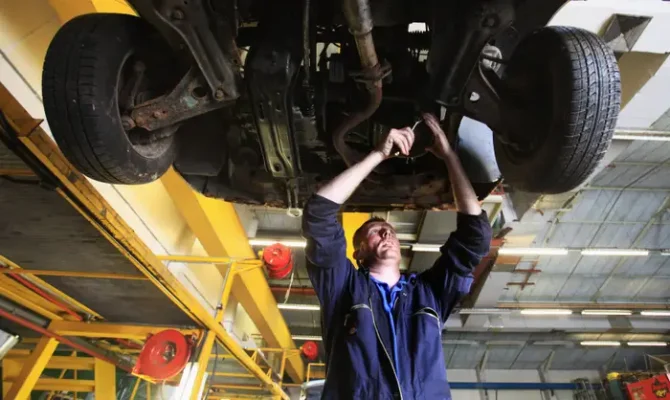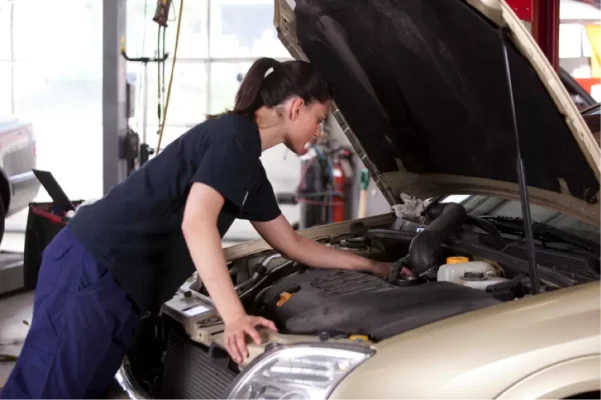When your car needs repairs or maintenance, one of the first decisions you’ll need to make is where to take it. Should you choose an independent automotive repair shop, or should you head to the dealership? Both options have their pros and cons, and making the right choice depends on several factors, including the type of repair, cost considerations, and your car’s warranty status.
In this guide, we’ll explore the differences between independent repair shops and dealerships, helping you make an informed decision for your vehicle’s service needs.
Expertise and Specialization
One of the main advantages of taking your car to a dealership for repairs is the level of expertise and specialization. Dealership mechanics are factory-trained and certified to work on specific brands, meaning they have an in-depth knowledge of your car’s make and model. This can be particularly valuable if you drive a luxury or high-performance vehicle with unique features or technology.
Dealerships also have access to the latest technical bulletins and software updates from the manufacturer, ensuring that your vehicle is serviced with the most up-to-date information and tools. If you have a newer car or a vehicle that’s still under warranty, a dealership may be your best bet for complex repairs.
On the other hand, independent repair shops can offer a broad range of expertise. While they may not be brand-specific, many independent mechanics are highly skilled and experienced in working with a variety of vehicles. If you own an older car or a model that’s out of warranty, an independent shop can often handle routine maintenance and common repairs just as effectively as a dealership, at a lower cost.

Cost Considerations
One of the most significant factors for many drivers when choosing between an independent shop and a dealership is cost. Generally speaking, independent repair shops tend to charge less for labor and parts compared to dealerships. Dealerships typically have higher overhead costs, and this is often reflected in their pricing.
For example, an independent shop may be able to source aftermarket or generic parts that are less expensive than the original equipment manufacturer (OEM) parts that dealerships often use. In many cases, aftermarket parts are just as reliable and can save you money without sacrificing quality.
However, dealerships may be more cost-effective in some situations, particularly if your car is still under warranty. Warranty coverage can reduce or eliminate the cost of certain repairs, making the dealership a more affordable option. Additionally, if your vehicle has a manufacturer recall or service campaign, the dealership will typically perform those repairs for free.
If cost is your primary concern, it’s a good idea to compare estimates from both an independent shop and a dealership before making a decision. Keep in mind that while independent shops may offer lower prices, the quality of service and parts used can vary, so it’s important to research the shop’s reputation before proceeding with any repairs.
Quality of Parts
Another key difference between dealerships and independent repair shops is the quality and type of parts used in repairs. Dealerships almost always use OEM parts, which are made by the car’s manufacturer and designed specifically for your vehicle. OEM parts are often considered to be of higher quality because they meet the exact specifications of the original components, ensuring compatibility and reliability.
Using OEM parts can be especially important for vehicles that are still under warranty or if you’re dealing with a major repair, such as replacing the engine or transmission. In some cases, using non-OEM parts can void the warranty, so it’s essential to confirm with your manufacturer before making any decisions.
Independent repair shops, on the other hand, may offer a choice between OEM and aftermarket parts. Aftermarket parts are often less expensive and can be just as reliable as OEM parts, depending on the brand and quality. If cost is a concern and the repair is not covered by a warranty, opting for aftermarket parts from a reputable brand can be a good way to save money without sacrificing performance.
When choosing between OEM and aftermarket parts, it’s important to weigh the pros and cons. If you prioritize quality and compatibility, especially for critical components, OEM parts are usually the best choice. However, if you’re looking for more affordable options for minor repairs, such as replacing brake pads or filters, aftermarket parts can provide good value.
Convenience and Location
Convenience is another factor that can influence your decision between a dealership and an independent repair shop. Dealerships are often located in larger cities or suburban areas and may not be as easily accessible for drivers in rural locations. If you live far from a dealership, an independent shop may be a more convenient option for regular maintenance and minor repairs.
Independent shops, on the other hand, are more widely available and often located closer to residential areas. This can be particularly useful for routine services like oil changes, brake repairs, or tire replacements, where convenience and quick turnaround times are important. Many independent shops offer flexible hours and may be able to accommodate your schedule more easily than a dealership.
Additionally, dealerships often require appointments, and depending on their workload, you may have to wait longer to get your car serviced. Independent shops may offer more flexibility in terms of walk-ins or same-day service, which can be a major advantage if you need quick repairs.
Warranty and Recalls
If your car is still under warranty, taking it to the dealership for repairs is often the best option. Most manufacturer warranties cover repairs for specific components, such as the powertrain or transmission, and dealership mechanics are trained to work within those warranty guidelines. Using an independent shop for repairs could void your warranty if non-OEM parts are used or if the mechanic doesn’t follow manufacturer-approved repair procedures.
Additionally, dealerships handle manufacturer recalls and service bulletins, which means that any repair related to a recall will be performed at no cost to you. This can be a major benefit if your car has an open recall or if the manufacturer releases a technical bulletin with a recommended fix for a known issue.
Once your vehicle is out of warranty, you have more flexibility in choosing between a dealership and an independent shop. Independent mechanics can often perform the same repairs as dealerships but at a lower cost, especially for common repairs like brake replacements, oil changes, or tire rotations.

Personalization and Customer Service
Customer service and personalization can vary significantly between dealerships and independent shops. Dealerships, especially large ones, may have more structured service processes, which can sometimes feel impersonal. You may deal with different service advisors or mechanics each time you visit, which can make it harder to build a personal relationship with your mechanic.
Independent repair shops, particularly smaller, family-owned businesses, often provide a more personalized experience. You’re more likely to deal directly with the owner or a single mechanic, which can lead to better communication and a stronger customer relationship. Some customers prefer the more hands-on approach and direct interaction that independent shops provide.
That said, many dealerships have stepped up their customer service game in recent years, offering amenities such as shuttle services, loaner cars, or comfortable waiting areas with free Wi-Fi. If these perks are important to you, a dealership might be the better option, especially if you need extensive repairs that will take several hours or even days.
Technology and Tools
Another advantage dealerships have over independent shops is their access to the latest diagnostic tools and equipment. Because dealerships are directly affiliated with the car manufacturer, they typically have specialized tools and software that can quickly and accurately diagnose issues with your vehicle. This can be particularly important for newer cars with advanced computer systems and electronics.
Independent repair shops, while capable of handling most repairs, may not have access to the same level of diagnostic equipment as dealerships. However, many independent shops invest in high-quality tools and technology to keep up with modern vehicles, so it’s worth asking what type of diagnostic equipment they use before committing to a repair.
Making the Right Choice
Ultimately, the choice between an independent automotive repair shop and a dealership comes down to your individual needs, preferences, and the specific circumstances of your vehicle. Here are a few key takeaways to help guide your decision:
- Choose a dealership if: Your car is under warranty, you need recall repairs, or you own a newer, more complex vehicle that requires brand-specific expertise and OEM parts.
- Choose an independent shop if: Your car is older, out of warranty, or if you’re looking for routine maintenance and basic repairs at a more affordable price. Independent shops can also provide a more personalized, customer-focused experience.
Whether you go with a dealership or an independent repair shop, it’s important to research the reputation of the service provider, compare estimates, and ask about warranties on parts and labor. By taking the time to evaluate your options, you can ensure that your car gets the care it needs without unnecessary stress or expense.

Please read more articles, this is the content you need:
Appliance Repair vs. Replacement: Which is More Cost-Effective?
Household appliances are an essential part of modern life, from refrigerators and dishwashers to washing [...]
Sep
How to Troubleshoot Common Appliance Repair Problems
Appliances are a part of everyday life, and when they malfunction, it can be frustrating. [...]
Sep
Understanding Personal Injury Laws in Australia
Personal injury laws in Australia are designed to protect individuals who have suffered harm due [...]
Aug
Electronic Device Repair Costs: What You Need to Know
In today’s fast-paced world, electronic devices have become essential for work, communication, entertainment, and daily [...]
Sep